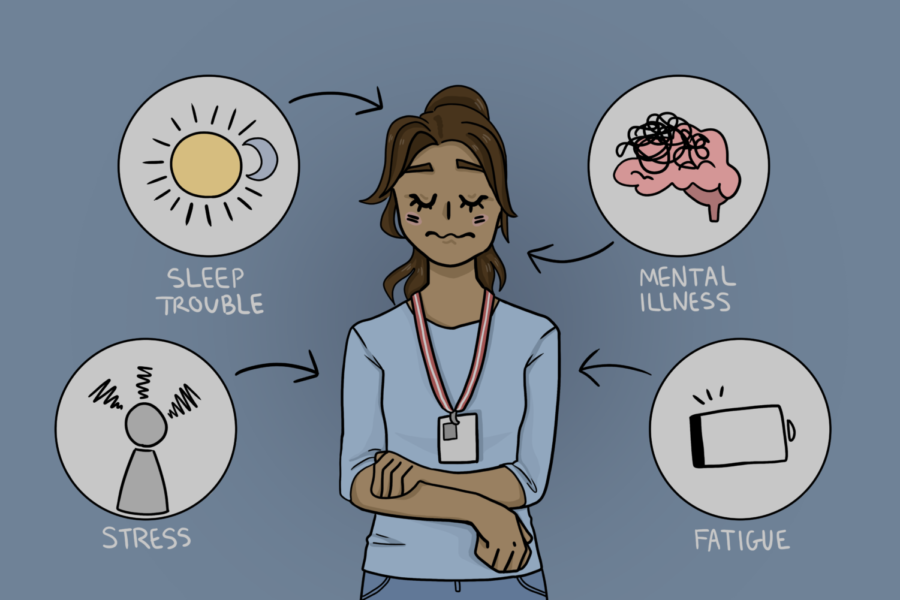My pain is invisible, not imaginary
Invisible illnesses are those that exist but are not directly visible from the outside. Many people suffer from symptoms of invisible illnesses such as stress, fatigue, trouble sleeping and mental illnesses.
October 3, 2019
The biggest thing I remember about being undiagnosed is thinking I was perfectly fine when my symptoms were staring me right in the face.
Over the summer, I alternated between 12 hours of sleep and 12 hours of sluggishness for days on end, and I saw no problem. Thankfully, my mother did; she dragged me to the doctor’s office for a blood test, where I was told that I had chronic anemia. There is something gratifying in receiving a diagnosis, in knowing that your struggles are legitimate and that there are others who experience the same thing. Before my diagnosis, I resented myself for acting lazy, but understanding that I had reason to do so and a way to fix it was a relief.
With that being said, I am luckier than most.
Many people, especially women, go undiagnosed for years. Women are often excluded from clinical research, causing a “knowledge gap” between the health of men and women. They experience symptoms differently, but doctors are trained to recognize male symptoms, leading to misdiagnoses. Additionally, women are traditionally stereotyped as overdramatic and medically inexplicable pain is easily attributed to the menstrual cycle. There are countless horror stories of women going undiagnosed and nearly losing everything because of it.
Medical conditions that are not inherently visible to others, such as mine, are collectively referred to as invisible illnesses. They are prevalent, with more than 125 million Americans having at least one chronic condition in 2000.
Despite being so common, invisible illnesses are seldom talked about for a multitude of reasons, one of which is a lack of understanding. People tend to judge based on appearances, but a healthy appearance does not necessarily indicate good health. A comment received frequently by those with invisible illnesses is, “but you look good!”, to the point where the phrase has become associated with the invisible illness community. It discourages discussion of invisible illness; being shut down by another who has not experienced the same pain is disheartening, even more so when that person is close.
Another reason invisible illnesses are rarely brought up is that they can often coincide with taboo subjects. I have had my fair share of awkward moments while trying to explain my anemia, as it is related to my reproductive health. Instagram influencer Shannon Barry (@barry_happy), who posts about her experience with Crohn’s, has discussed the shame she felt about having a gastrointestinal disease.
“Your pain is more important than their discomfort,” Barry wrote. “They are allowed to not listen, but it is not your job to stop talking.”
A close friend of mine, Coppell High School sophomore Risa Azim, deals with asthma and hypothyroidism. She shares Barry’s belief in being honest about her health.
“I am really open to everyone about my illnesses. They’re just a part of me,” Azim said.
Illness also comes with the feeling of missing out. In the summer, when I was sleeping for 12 hours a night, I felt like I was missing out on waking hours and life in general. My sleep issue has improved with treatment, but it is still there. Any less than eight hours of sleep means I will be completely unable to think straight for the first two hours of the day.
However, illness means missing out on the little things in life as well. I can no longer drink coffee or tea, both of which I love. My friends and I like to hang out at cafes and boba shops, so it can be hard not to feel as if I am missing out. It seems insignificant, but it stops me from being able to fully enjoy the things I like. Barry has shared similar experiences with Crohn’s.
“My friends see the seat where I should’ve been but not how hard I cry about it the night before,” Barry wrote. “I really hate missing out.”
Azim, too, finds herself being held back by her illness.
“When people eat a lot, I’m not always able to eat with them,” Azim said. “There are certain foods that I really shouldn’t eat because my body processes them too slowly.”
Despite everything, it is OK to be sick.
Illnesses are inevitable; they affect all aspects of life and can make everything feel overwhelming. It already takes sick people so much energy to be ill, so spare them the additional stress of pretending not to be. Treat them with understanding and open-mindedness. After all, Barry tells it better than I ever could:
“I am a force of nature,” Barry wrote. “The world will wait for me.”
Follow Angela (@anglealey) and @CHSCampusNews on Twitter.













Sarah Habib • Oct 3, 2019 at 3:36 pm
Powerful title, I love it!!